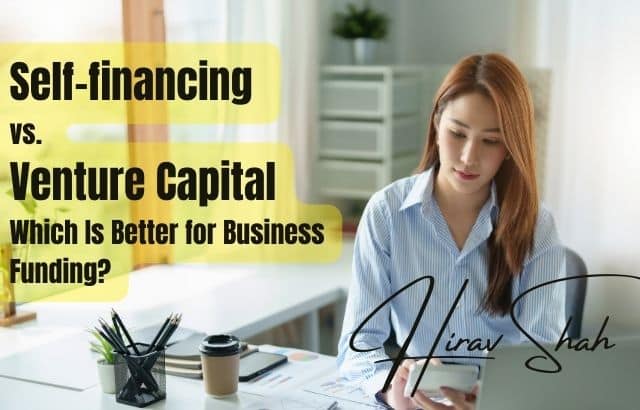Founders use venture capital funding for scaling a company. Founders who don’t have experience scaling or need specific advice and contacts in a new industry to scale can benefit from venture capital funding. Also, if the startup requires multiple funding rounds in the millions of dollars for growth or is in an untapped growing market, venture capital can be a great source of funding.
Some of you do not realize, but we are proud to call itself a self-financed venture. Unlike others of our peers, this ensures that we have never drawn money out of investment capital firms or foreign partners. We admire what venture capitalists have to do, and without any hesitation, several world-class ideas and startups will not operate without their help today. However, this path often has benefits and drawbacks.
So Validation Expert Hirav Shah looks at the eight benefits of not becoming a risk-based business and how you can also create a productive and efficient company with Business Plan Consultancy, with a priority on building value for the clients and developing a lean startup team.
Table of Contents
Self-Financing is not so Risky
Self-financing is not that bad. This may now, of course, be discussed in both directions. We should both accept, though, that the field of business people and traders is relentless, hard-working, and intensely productive. On the other hand, few businesses are successful, and therefore every owner should carefully consider whether or not to use venture capital. Many of you already know Silicon Valley show from HBO, and even though it’s a sitcom, Neil Patel has written a great post on 10 Digital Marketers’ Lessons. Much of what they talk about is overcrowded, but some wisdom can be squeezed away from this series.
You can more easily say NO
We all know that with any business, there are good and bad customers. You’ve probably all had a good laugh with the Clients From Hell site at one point or another. And while this parody is meant to be a parody, it is closer to the real thing than many realize. There is always that customer who will take 90% of your time, while you will never hear from others. In such situations, it may be wise for your business to say no. And in some cases, in part. When you start, you can more easily select your clients and say no whenever it makes sense to help your team and your mission move forward.
Loyalty and priority for customers
When you self-finance a business, all of your income comes from your customers, so they instantly become your number one priority, not investors. This is a victory for both customers and the company. We always try to go above and beyond for our clients, and while there are things we don’t take care of, like development work, we’ll always try to help. Much of our growth over the years has come from word of mouth and customer referrals. We love our customers, we have built a great relationship with them, and we wouldn’t be here without them!
Self-financing forces fast, unconventional thinking
The shortage of resources to solve challenges pushes you to consider cost-effective and innovative approaches to such issues. We have to look outside the window. Self-funded companies don’t necessarily have a $15,000 budget to invest in Google AdWords per month. This pushes you to consider less traditional alternatives to specific issues. Over time, that would help you to address challenges and also focus on the sales cost (CPA) and the expected lifetime value of a consumer.
One goal: to earn money
When you self-finance a business, the main and only goal is to make money rather than spend it. Many venture-backed businesses are built or structured to grow their user base or the number of installations as quickly as humanly possible. Even if they are not paying customers, as they are just looking to be acquired or withdrawn quickly. There is certainly value in users, but if your plan fails, those users could be worthless overnight.
Keep more control
One of the most obvious benefits of not being a venture-backed company is, of course, that you have more control. Chances are, one of the reasons you start a business is primarily to have some autonomy. If you have a good idea and you can make it come true, why entrust some of it to outside investors who probably don’t like your product or service as much as you do? The sooner you sell stocks, the more it will cost you, as you will suddenly lose leverage for later, as well as dilution.
New employees are properly assessed.
It goes without saying that new contracts are really necessary if you’re a self-funded or risk capital-backed business. Nevertheless, a recruit is much more important to your survival as you have minimal funds. When you are granted $10 million by a venture capitalist, the first thing you would possibly do is to immediately hire the majority of the team and continue scaling up.
One of the benefits of self-support is that the whole cycle is streamlined simply by hiring more workers while the business expands and receives more. The employer will then quickly assess each employee and his or her abilities and ensure that they are in total alignment with business success.
Stronger if you survive
You will have a solid, lean, effective, customer-oriented, and forward-looking company if you survive self-financing. You know what works and what does not, where your advertisement, growth and service activities and app engagement platforms should be centered.
Empowering Financial Independence: Quotes on Self-Financing by
Hirav Shah: The Man Behind Many Globally Successful Brands – Business Turnaround Specialist and Value Accelerator
“Self-financing is the cornerstone of financial independence.”
Explanations:
Self-financing refers to the practice of funding ventures or expenses using one’s own resources, without relying on external loans or investments. By relying on your own funds, you retain full control over your financial decisions and avoid the burden of debt or equity obligations.
Strategy:
To implement self-financing, prioritize saving and investing a portion of your income regularly. Create a budget to track your expenses and identify areas where you can cut costs or redirect funds toward your financial goals. Consider alternative sources of income, such as freelance work or passive investments, to supplement your savings.
Execution:
Execute your self-financing strategy by consistently saving a portion of your income and investing it in assets that generate returns over time. Avoid unnecessary expenses and prioritize spending on essentials or investments that align with your long-term financial goals. Stay disciplined and committed to your savings plan, adjusting it as needed to accommodate changing circumstances or goals. By taking control of your finances and funding your ventures with your own resources, you pave the way for financial independence and security.
“Self-financing empowers individuals to pursue their dreams on their own terms.”
Explanations:
Self-financing liberates individuals from the constraints of external funding sources, allowing them to pursue their goals and aspirations independently. By relying on their own resources, individuals retain creative control and decision-making authority, enabling them to chart their own path to success.
Strategy:
To leverage self-financing effectively, assess your financial situation and identify opportunities to generate additional income or reduce expenses. Develop a clear plan for funding your ventures or projects using your own savings, investments, or earnings. Consider alternative financing options, such as bootstrapping or crowdfunding, to supplement your resources if necessary.
Execution:
Execute your self-financing strategy by allocating funds from your savings or income toward your ventures or projects. Be resourceful and creative in finding ways to minimize costs and maximize returns on your investments. Stay focused on your long-term goals and objectives, avoiding distractions or temptations that may derail your financial plans. By taking ownership of your finances and pursuing your dreams on your own terms, you unlock the potential for personal and professional fulfillment.
“Self-financing fosters financial discipline and accountability.”
Explanations:
Self-financing requires individuals to manage their resources responsibly and make strategic decisions about how to allocate their funds. By taking ownership of their finances, individuals develop discipline, resilience, and accountability, which are essential qualities for long-term financial success.
Strategy:
To cultivate financial discipline, establish clear financial goals and priorities, and create a budget to track your income and expenses. Set aside a portion of your earnings for savings and investments, and avoid unnecessary debt or expenses that may detract from your long-term objectives. Seek opportunities to increase your income or optimize your spending to maximize your financial resources.
Execution:
Execute your self-financing strategy by adhering to your budget and savings plan, making informed decisions about how to allocate your funds. Prioritize investments that align with your goals and risk tolerance, and regularly review your financial progress to identify areas for improvement or adjustment. Stay accountable to yourself and your financial objectives, taking proactive steps to stay on track even in the face of challenges or setbacks. By cultivating financial discipline and accountability, you set yourself up for sustainable financial success and security.
“Self-financing promotes financial resilience and independence.”
Explanations:
Self-financing empowers individuals to build resilience and adaptability in the face of financial challenges or uncertainties. By relying on their own resources, individuals develop the skills and mindset needed to navigate economic fluctuations and maintain their financial independence over the long term.
Strategy:
To foster financial resilience, prioritize building emergency savings and creating multiple streams of income to mitigate the impact of unexpected expenses or income disruptions. Diversify your investments and assets to spread risk and protect against market volatility. Develop a long-term financial plan that accounts for potential risks and uncertainties, and regularly review and adjust your strategy as needed.
Execution:
Execute your self-financing strategy by proactively building emergency savings, investing in assets that provide both stability and growth potential, and diversifying your income sources. Stay vigilant and adaptable in response to changing economic conditions, adjusting your financial plan and priorities accordingly. Cultivate a mindset of resilience and independence, recognizing that self-reliance is the key to long-term financial security and well-being. By embracing self-financing as a means of promoting financial resilience and independence, you position yourself to thrive in any economic environment and achieve your long-term financial goals.
“Self-financing offers greater control and flexibility in financial decision-making.”
Explanations:
Self-financing allows individuals to retain full control over their financial decisions and priorities, free from external obligations or constraints. By funding ventures or projects with their own resources, individuals have the flexibility to pursue opportunities that align with their values, goals, and risk tolerance, without compromising their autonomy or integrity.
Strategy:
To leverage the benefits of self-financing, prioritize building a strong financial foundation through saving, investing, and strategic planning. Establish clear financial goals and objectives that reflect your values and priorities, and develop a roadmap for achieving them. Build emergency savings and reserves to provide a cushion against unexpected expenses or income fluctuations, and avoid unnecessary debt or expenses that may limit your financial flexibility.
Execution:
Execute your self-financing strategy by making deliberate and informed decisions about how to allocate your financial resources, taking into account your short-term and long-term goals, as well as your risk tolerance and time horizon. Stay vigilant and proactive in monitoring your financial progress and adjusting your strategy as needed to stay on track. Be open to opportunities for growth and diversification, while remaining mindful of your overall financial health and objectives. By embracing self-financing as a means of gaining greater control and flexibility in your financial decision-making, you empower yourself to create a more secure and fulfilling future.
Hirav Shah wraps it up by saying, “As you can see, when determining whether or not to pursue the risk capital path, a lot must be weighed. We’re honored to be a business-funded enterprise herein, and we know we’ve built a better squad. Our development is really fast, and from the beginning, we were productive. We are not resistant to venture capital funding, so we will seek to locate the right investors if necessary, but we firmly feel that self-financing is better for ourselves and our clients. Without Venture Capital funding, you can create a profitable company, so do not let anyone push you. Self-financing will take you longer to go, but it could be the greatest decision you have ever made.“































